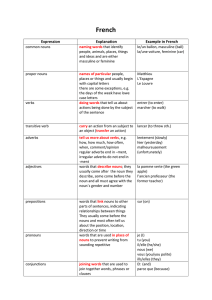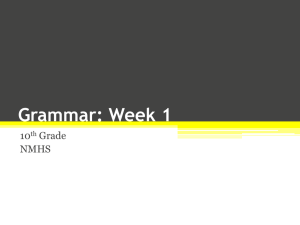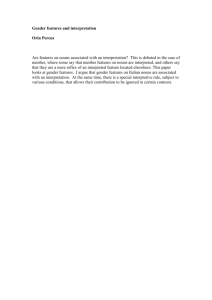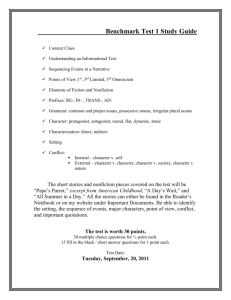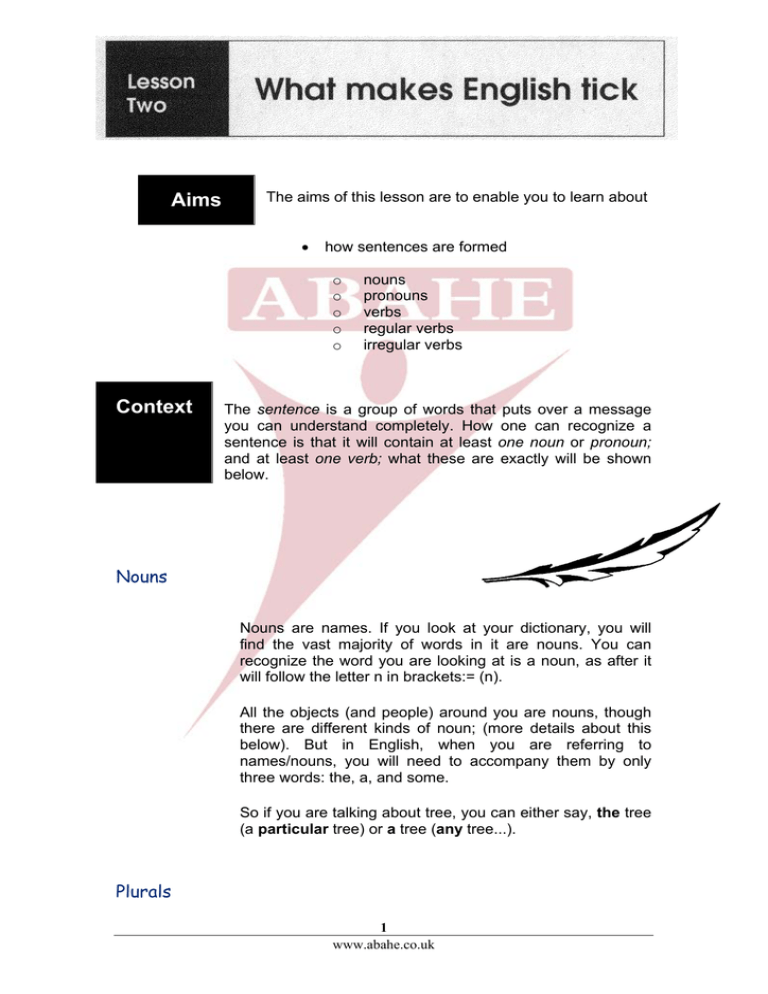
Arab British Academy for Higher Education
Aims
The aims of this lesson are to enable you to learn about
how sentences are formed
o
o
o
o
o
Context
nouns
pronouns
verbs
regular verbs
irregular verbs
The sentence is a group of words that puts over a message
you can understand completely. How one can recognize a
sentence is that it will contain at least one noun or pronoun;
and at least one verb; what these are exactly will be shown
below.
Nouns
Nouns are names. If you look at your dictionary, you will
find the vast majority of words in it are nouns. You can
recognize the word you are looking at is a noun, as after it
will follow the letter n in brackets:= (n).
All the objects (and people) around you are nouns, though
there are different kinds of noun; (more details about this
below). But in English, when you are referring to
names/nouns, you will need to accompany them by only
three words: the, a, and some.
So if you are talking about tree, you can either say, the tree
(a particular tree) or a tree (any tree...).
Plurals
1
www.abahe.co.uk
Arab British Academy for Higher Education
The plurals are easy: the remains the same, and a changes
to some...
the books; some books (or just books).
It probably seems pretty obvious but plural nouns in English
mostly end in s, or es as in boxes,foxes.
Until you notice that quite a few plural nouns end in some
other letters, or in some cases they do not change at all...
Please note the following:
Man - men; woman - women; child - children; ox - oxen;
But: fish -fish, sheep - sheep...
Different Kinds of Nouns
There are in English four types of noun: common, proper,
collective, and abstract.
These are easy to recognize, but you have to recognize by
their meaning, not their appearance. Here are the
definitions of each:
Common: as is shown by the name itself, most nouns are
common; there is by definition nothing special about them...
e.g.: book, chair, man, woman.
Proper: these nouns are names, and always start with
capital letters; e.g. Peter, Paris, Ben Nevis...
Collective: as you can see from the name itself, this type of
noun refers to groups, and often is followed by a plural verb,
even though the noun does not end in s... However the
collective may easily be followed by a singular verb, you
have to learn these quite tricky nouns one at a time,
e.g. the people are in charge
But: there is a crowd in the square
Abstract: these nouns refer to ideas, values, that you can’t
see physically, more feel: e.g. happiness, fear, truth, faith,
hatred; love; friendship.
2
www.abahe.co.uk
Arab British Academy for Higher Education
War is difficult as although it is in a sense invisible it has a
physical presence and therefore cannot be called abstract.
Peace however is definitely abstract. Interesting!
n.b. Please see over for a study of our masculine, feminine,
and neuter nouns, which can equally be common or
proper...
But not collective or abstract; why you will see!
Masculine, Feminine, Neuter
The different types of Nouns presented, Common, Proper,
Abstract, Collective, do not affect their gender i.e. whether
they are Masculine, Feminine, or Neuter.
Our system is a very sensible one: Male nouns are
Masculine, Female nouns are Feminine, and all non-living
things are Neuter.
Animals present a grey area, as only some are definitely
male and female: e.g. cock, hen, bull, cow, dog, bitch. But
we usually refer to for example dogs and cats, as such
regardless of sex. Interestingly we tend to personalize our
possessions, for example, cars, boats and so on are often
referred to as she...
Pronouns
Life would be very boring if we only had nouns as we
should have to go in for endless repetition...The main
pronouns or replacing words are the following:
he, she,
they
it,
When they are used is obvious, but the technical name of
these words: subject pronouns will be helpful.
All Rights Reserved © Arab British Academy for Higher Education
3
www.abahe.co.uk



